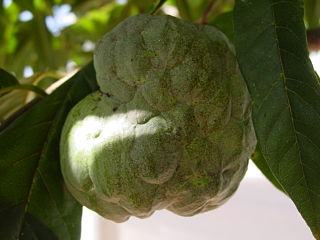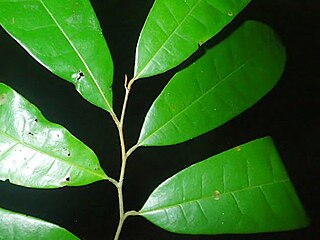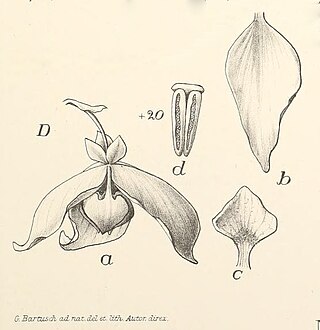
The Annonaceae are a family of flowering plants consisting of trees, shrubs, or rarely lianas commonly known as the custard apple family or soursop family. With 108 accepted genera and about 2400 known species, it is the largest family in the Magnoliales. Several genera produce edible fruit, most notably Annona, Anonidium, Asimina, Rollinia, and Uvaria. Its type genus is Annona. The family is concentrated in the tropics, with few species found in temperate regions. About 900 species are Neotropical, 450 are Afrotropical, and the remaining are Indomalayan.

Cauliflory is a botanical term referring to plants that flower and fruit from their main stems or woody trunks, rather than from new growth and shoots. It is rare in temperate regions but common in tropical forests.
Isolona is a genus of flowering plants in the family Annonaceae. There are 21 species native to Africa. They occur in humid habitat types.
Isolona zenkeri is a species of plant in the Annonaceae family. It is found in Cameroon, The Republic of the Congo and Gabon. Adolf Engler, the German botanist who first formally described the species, named it after Georg August Zenker who collected the sample Engler examined. Its natural habitat is subtropical or tropical moist lowland forests. It is threatened by habitat loss.

Uvariastrum zenkeri is a species of plant in the Annonaceae family. It is found in Cameroon and Nigeria. It is threatened by habitat loss.

Uvariopsis is a genus of flowering plants in the family Annonaceae. The genus is unique to Africa, and consists of about 18 species, all of which are either ramiflorous, cauliflorous or both.
Uvariopsis vanderystii is a species of plant in the Annonaceae family. It is found in Cameroon, the Democratic Republic of the Congo, and Gabon. Its natural habitat is subtropical or tropical moist lowland forests. It is threatened by habitat loss.

Xylopia africana is a species of plant in the Annonaceae family. It is found in west-central Africa. It is restricted to submontane and lower montane forests. It is threatened due to habitat loss by clearance of forest. It was first described as Melodorum africanum in 1862 by George Bentham.
Oxyrhachis is a genus of African plants in the grass family. The only known species is Oxyrhachis gracillima, native to Sierra Leone, Nigeria, Cameroon, Tanzania, Madagascar, KwaZulu-Natal, Cape Province.

Acer pentaphyllum is a very rare, endangered maple species endemic to southwestern Sichuan in China, at altitudes of 2300–2900 meters.
Uvariopsis korupensis is a species of flowering plant in the family Annonaceae endemic to Cameroon.
Meiocarpidium is a genus of plants in the family Annonaceae. It is distributed in Cameroon, The Central African Republic, The Republic of the Congo, and Gabon. Adolf Engler and Ludwig Diels, the German botanists who first formally described the genus, named it after the small number of carpels in the flowers.

Meiocarpidium lepidotum is a species of plant in the family Annonaceae. It is native to Cameroon, The Central African Republic, The Republic of the Congo, and Gabon. Daniel Oliver, the English botanist who first formally described the species using the basionym Unona lepidota, named it after rust-colored, shiny scales on its branchlets, the underside of its leaves and its buds.
Monodora crispata is a species of plant in the family Annonaceae. It is native to Cameroon, Equatorial Guinea, Gabon, Ghana, Guinea, Ivory Coast, Liberia, Nigeria, and Sierra Leone. Heinrich Gustav Adolf Engler, the German botanist who first formally described the species, named it after its curled petal margins.

Monodora junodii is a species of plant in the family Annonaceae. It is native to Eswatini, Kenya, Malawi, Mozambique, South Africa, Tanzania, and Zimbabwe. Heinrich Gustav Adolf Engler and Ludwig Diels, the German botanists who first formally described the species, named it after Henri-Alexandre Junod, the Swiss missionary and scientist who collected the specimen that they examined.

Pseudoxandra leiophylla is a species of plant in the family Annonaceae. It is native to Brazil, Colombia, and Venezuela. Ludwig Diels, the German botanist who first formally described the species using the basionym Unonopsis leiophylla, named it after its smooth leaves.

Mischogyne elliotiana is a species of plant in the Annonaceae family. It is native to Cameroon, Gabon, Ghana, Guinea-Bissau, Ivory Coast, Liberia, Nigeria, Sierra Leone, and Zaire. Adolf Engler and Ludwig Diels, the German botanists who first formally described the species using the basionym Uvaria elliotiana, named it after George Scott-Elliot the botanist who collected the specimen they examined.

Neostenanthera gabonensis is a species of plant in the family Annonaceae. It is native to Cabinda Province, Cameroon, Equatorial Guinea, Gabon, Ghana, Ivory Coast, Liberia, and The Republic of the Congo. Heinrich Gustav Adolf Engler and Ludwig Diels, the German botanists who first formally described the species, using the basionym Oxymitra gabonensis, named it after Gabon where the specimen they examined was found near a site they identified as Sibange-Farm.

Uvariopsis dicaprio is a species of tropical evergreen tree in the genus Uvariopsis. It is endemic to the Ebo Forest, in the Littoral Region of Cameroon. It was the first new plant species described in 2022, and was named after American actor Leonardo DiCaprio by botanists Martin Cheek and George Gosline, from the Royal Botanic Gardens, Kew. U. dicaprio is classified as Critically Endangered in the IUCN Red List.

Uvariastrum insculptum is a species of plant in the Annonaceae. It is native to Cameroon, Gabon, Ghana, Ivory Coast, Liberia, Nigeria, and the Republic of the Congo. Adolf Engler and Ludwig Diels, the botanists who first formally described the species using the basionym Uvaria insculpta, named it after the secondary veins on its leaves which are distinctly sunken.












